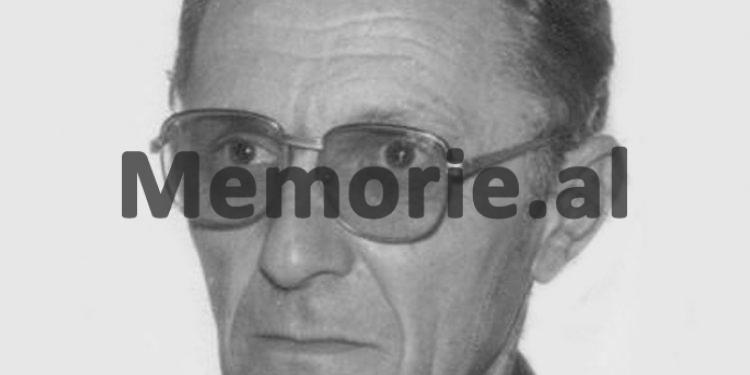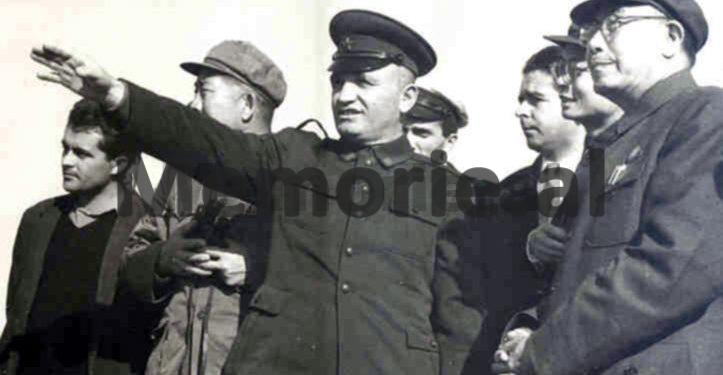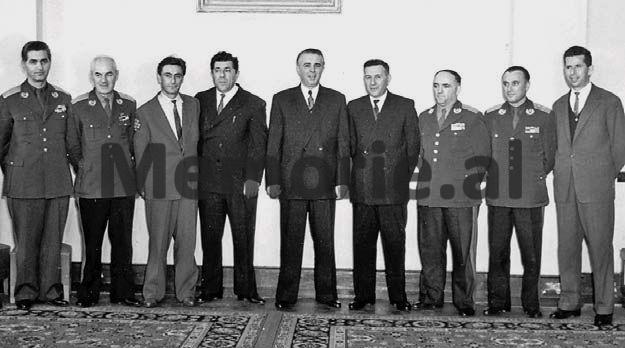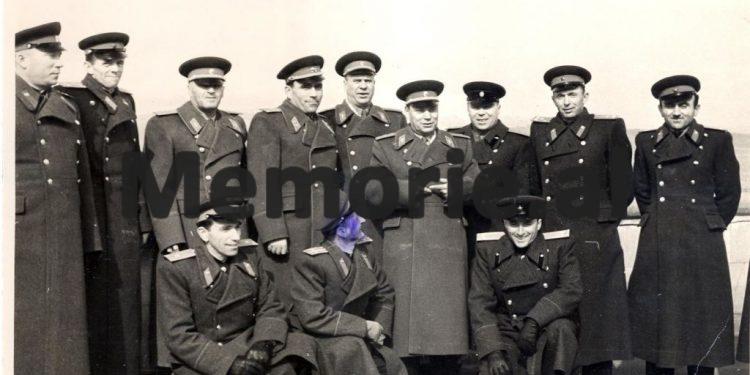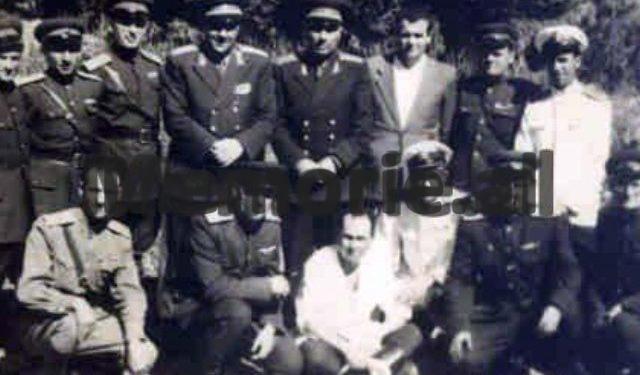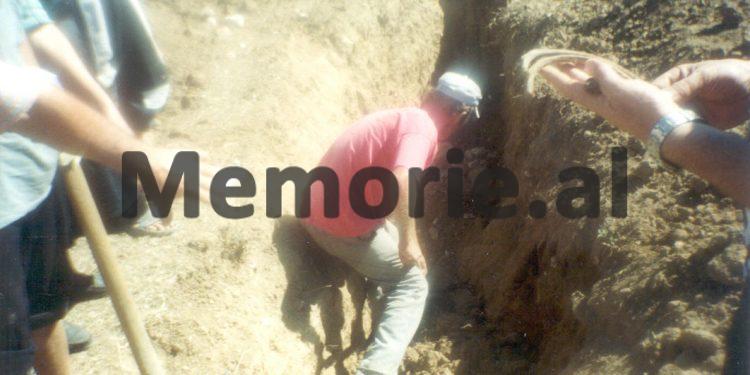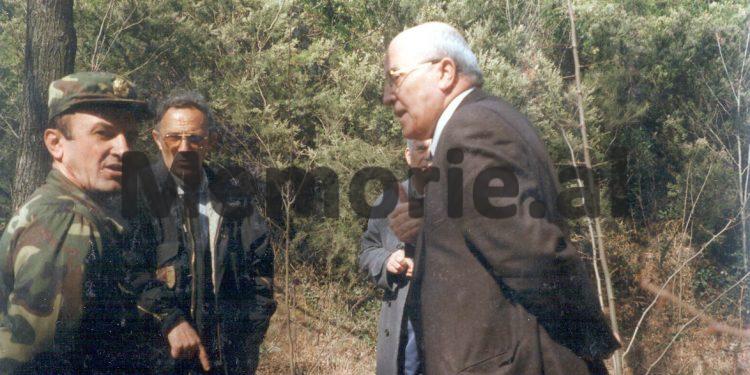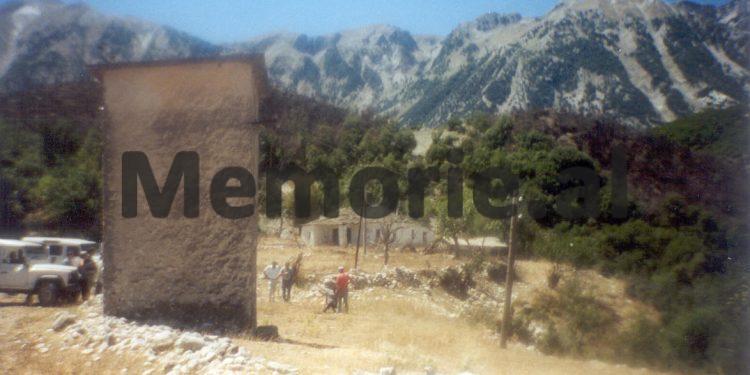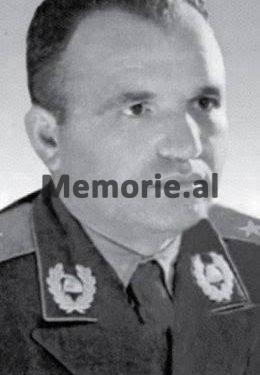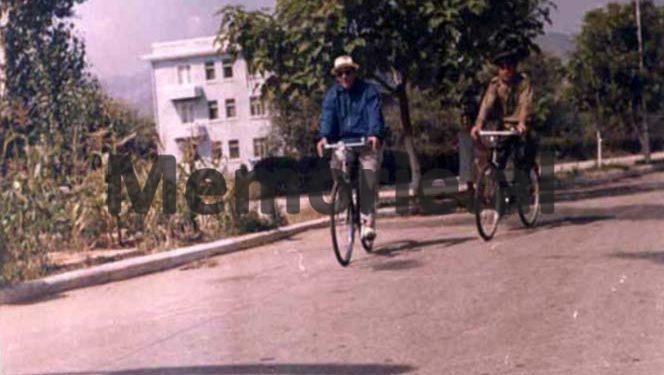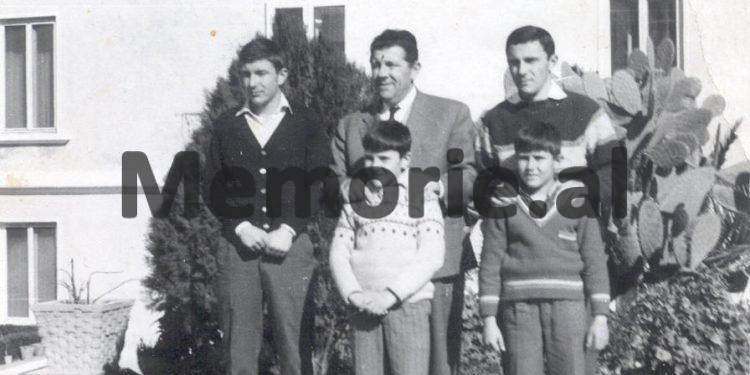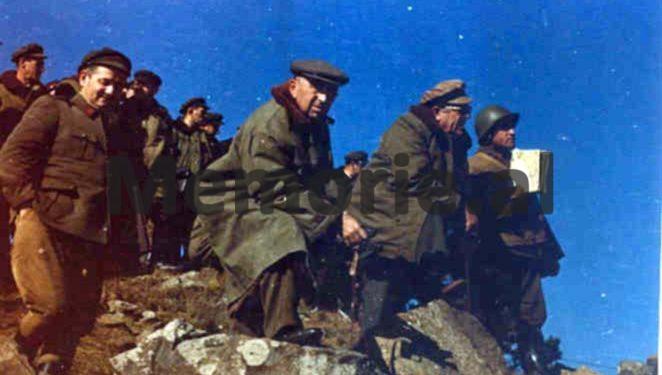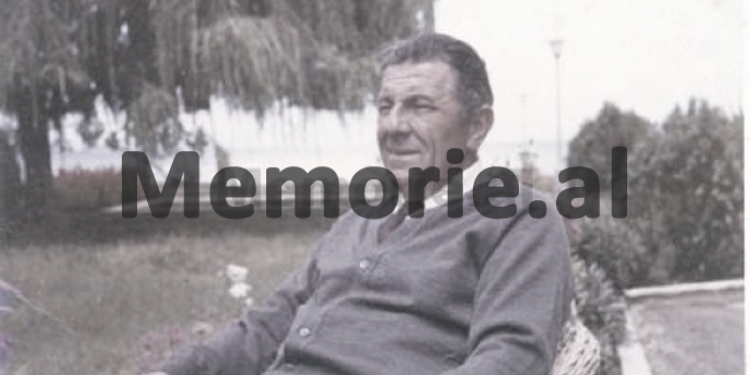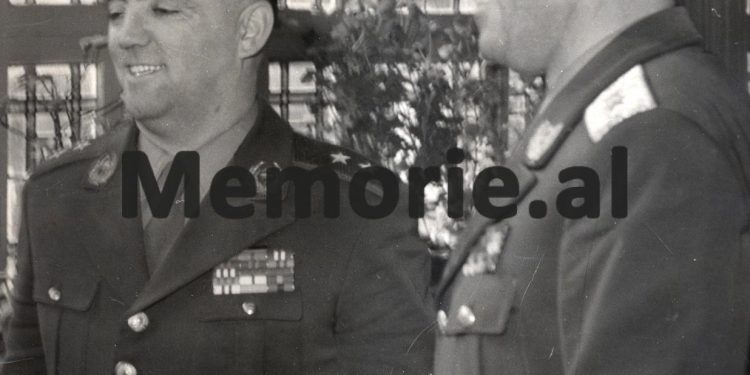Dashnor Kaloçi
Memorie.al publishes the unknown story of Beqir Balluku, former Minister of People’s Defense, member of the People’s Assembly, member of the Political Bureau of the Central Committee of the ALP and first deputy prime minister of the government led by Mehmet Shehu, who was shot in a secret tunnel on the outskirts of Tirana near the village of Linza on November 5, 1975, after being sentenced to death by the Supreme Court of the People’s Republic of Albania, accused of being “the leader of a coup group in the army”. Rare testimony of Çlirim Balluku, the eldest son of the Balluku family, since the origin of the family, the period of the Zog Monarchy, his activity during the Anti-Fascist War, education, functions and duties after 1945, relations with Enver Hoxha, Mehmet Shehu, Hysni Kapon, Gogo Nushi, etc., from the senior leadership of the ALP, as well as why the criticism and attack on him began in 1974, who were the ones who attacked him the most in the first meetings, what was he told his children when he returned home after being attacked as an “enemy of the people”, his exile and family, the execution together with his two subordinates, Petrit Dumen and Hito Çako in one of the secret tunnels of Linza on the outskirts of Tirana, how the family learned that when he was in exile, until the many vicissitudes after the ’90s to find his remains in the village of Vranisht in Vlora, where they were buried by order and under the care of Kadri Hazbiu.
“The crackdown on our father, Beqir Balluku, who for years held the post of Minister of Defense and First Deputy Prime Minister in the government headed by Mehmet Shehu, began in June-July 1974 with the extended meeting of the Army Assets, which was held in Villa Zogu of the city of Durrës. The blow against him was prepared on the basis of a scenario well designed by the main leaders of the high “pyramid” of the ALP, with special people within the ranks of the Ministry of Defense. This is also confirmed by the fact that the accusations against him started at a time when the material with the theses that were to be submitted for discussion in the Defense Council, had not yet been made public and were locked in the safe of the office in the Ministry of Defense. After that, he was analyzed in the meetings of the Politburo, where Enver Hoxha was the first to direct the attacks on him, accusing him of being the greatest traitor that Albania had until then. After those meetings of the Politburo, the father was also analyzed in the Fifth Plenum of the Central Committee of the ALP, which was held on July 25, 1974, where he was attacked by someone more and by someone less. At the end of that Plenum he was expelled and dismissed from all party and state functions. After that meeting, the father was not arrested as many of the former senior personalities of the top communist leadership who had been beaten years ago, but was released to come home. I remember as now when my father came home after that meeting and told us everything that had happened at that Plenum, as well as the decisions that had been made there in the address of his person. At the heart of those words that our father said to us that afternoon in our house, where all of us family members had gathered, was that he was not a traitor and had never betrayed the Party and Enver Hoxha. After that day, the father stayed for another ten days without leaving the house at all, as even those who hit him had not yet decided where they would send him. During those ten days that my father did not leave the house at all, near our villa in Bllok, the security measures were strengthened, which was evident from the addition of the Guard soldiers. During that time, in the conversations he had with us, for the first time Beqiri spoke openly against the senior leadership of the Party, telling us that it was hitting him in vain and everything that was said in his address was manipulated “.
Testimony for Memorie.al, Çlirim Balluku, the eldest son of the former Minister of Defense, member of the Politburo and the first deputy prime minister in the communist government headed by Mehmet Shehu, who tells the whole unknown story of his father, Beqir Balluku, considered one of the most popular leaders of the communist regime of Enver Hoxha, who was shot on November 5, 1975 in a secret tunnel on the outskirts of Tirana near the village of Linza, along with his two subordinates, Chief of Staff Petrit Dumen and Political Director of the Army Hito Çako.
Who was Beqir Balluku, what was his origin and past and where was he educated? How did Beqiri first associate with communist groups, who were his closest comrades during the War and how did he first meet Enver Hoxha in 1943? What were the accusations made against Beqir Balluku by Enver Hoxha at the meetings of the Politburo and the Fifth Plenum held on July 25, 1974 and what was Beqiri told to his family after that meeting where he was expelled from all party and state functions? What happened to Beqir during those ten days that he remained isolated in his Block villa, who was the only man who could enter his house and what orders did he give to his children? What did the party secretary of the Albanian Radio-Television, Liberation, ask Beqir’s eldest son, when he called him to his office and what was the answer, he received from him? How was Beqir removed from his Bllok villa to be interned in Roskovec, Fier, and how was he arrested on December 7, 1974 when he was interned in Selenica, Vlora? How did the Balluku family learn of Beqiri’s execution and how were they treated from that period until 1991 when they remained interned in Selenica, Vlora?
Çlirim Balluku, is the eldest of six children of Beqir Balluku, former Minister of Defense, MP, member of the Politburo and First Deputy Prime Minister in the communist government of Mehmet Shehu, who remained in those high positions until 1974, when he was accused and beaten by Enver Hoxha, calling himself a saboteur, enemy and leader of the “Military Coup” that aimed at the violent overthrow of popular power in Albania. As the eldest of the Balluku family, Çlirimi remembers quite well and has experienced many of the events of that distant time when his father was at the highest peaks of the communist regime of Enver Hoxha, as well as later when he was attacked by Enver on the most serious charges, which have already been made public to the wider reader by numerous publications in the daily press after the 1990s. Based on this fact and to get acquainted even more with the unknown side of the figure of Beqir Balluku and his family, in the continuation of dozens of articles of this nature that have found a place on the pages of Memorie.al, we addressed you for a long interview with Mr. Çlirim Balluku, which we are publishing starting from this issue.
Followed by the last number
Mr. Çlirim, did anyone from your family or the circle of relatives you had at that time come to meet you in Selenica?
I wanted to say that it was a unique case, the attitude of my wife Zana’s family towards our family. From the time we were in Memaliaj until the end of the internment in Selenica, Vlora, for 16 years in a row, they have come to meet us there without the slightest shyness and without taking into account the consequences they could have. My father-in-law, Sabri Hoti, was fired from his position as deputy prosecutor and expelled from the party. Drita, his wife, who worked as an economist, was expelled from the party, Zana’s two sisters, Mira and Meli, were also fired from their jobs. And despite these repressions they had as a family, everyone came to us and visited, even my mother, sister and brothers. There were times when Zana’s two sisters, Majlinda and Lida, although they were still young, (in 1975) took the road and came to us to meet us. Likewise, I cannot leave without mentioning Zana’s mother, Drita, this woman with a great soul, who, among other things, has raised my two daughters since the age of two and beyond. It has been my destiny to connect with this family.
Did you suffer a lot during the time you were interned in Selenica, Vlora?
I do not want to talk at length about our life and suffering in Selenica, because even now, after so long, I rarely remember it when I am asked. Working in the mine where the four of us worked was very difficult. But the biggest blow to our family was the arrest of our brother, Lad, on March 14, 1979.
How and why did Ladi get arrested?
The communist regime created absurd lawsuits in order to keep the whole family under pressure and fear. I wanted to say that the communist regime at that time did not even respect its own laws, because in the case of my family and that of my sister, Drita, we did not have to be exiled, because we lived separately from the rest of the family. But these things were not taken into account and in the end our family, in addition to the execution of the father, suffered a total of 124 years of exile and 12 years in prison. These figures do not include the family of our uncle, Qemali, who was interned in Ballsh, or the son of our aunt, Iqbal, who suffered three years in prison. Likewise, here I am not counting the inquisition that was exercised against our relatives and friendly circle, without also counting the sentence and suffering of dozens of dependents, friends and comrades of the father who ended up in prison. In a word, I wanted to say that Enver Hoxha not only executed our father without any guilt, but also took the most expensive thing we had, the youth.
When you returned to Tirana, did you have housing problems?
We returned to Tirana in April 1991 and obviously encountered great difficulties especially for housing. The houses that my sister Drita and I had had were not considered and were not given to us when we returned. As for the mother and other family members, it was not even about housing. Perhaps this is one of the main reasons that only me and brother Ladin are left in Albania, as the others have been forced to emigrate for years and are located in the USA, Canada and France.
After returning to Tirana, you started trying to find the remains of your father, Beqir Balluku, did you think about this during your internment?
At the time of the internment, it was not even thought that we would seek or be interested in it, for reasons that are already known and need not be mentioned again. Of course, after returning to Tirana we started to move to find the father’s bones, having him as one of our main targets.
Did you have problems and what difficulties did you face at that time?
From the beginning of our research we encountered many difficulties, because in the relevant department, in the Ministry of Interior, there was a complete lack of documentation that interested us. This was also made more difficult by a part of the media that, with the news and articles given, misled us even more, because they were finishing what Beqir Balluku’s remains had been burned.
What was the first step you took to start the search?
The first step we took was to complete the scheme with the names of persons who had dealt with the isolation and trial of the father. Our uncle, Qemal Balluku, was also involved in this, as he had knowledge about the functioning of the Ministry of Interior and could also collect data from his friends. This scheme included the prosecutor, investigators, doctor and the person in charge of the third siege of Tirana Prison (Ward 313), where the isolated father was held. So, at that time, I learned that the Tirana Prison in the period 1974-75, had three levels of siege, this is an unprecedented case.
Where did you get the most support from the ones you mentioned?
The uncle, Qemali, judged that the point of reference should have been the responsibility of the three sieges and the truth came out because the first three did not tell, as they had no knowledge of the execution and the place of burial.
Did you find that person and was he willing to help you?
After much searching, because he was not there, we had our first meeting with him in 1996, talking in the offices of the Ministry of Defense. In that meeting, besides me and my brother, Agim, there were also Spartak Dume, the nephew of Petrit Dume, with Çobo Skënder, the nephew of Hito Çako. That meeting was made possible by Çobo Skënderi, telling us that the person we were looking for agreed to talk to us. At that meeting he spoke for the first time, telling us that he knew approximately the place (after 21 years had passed) which was located somewhere in the village of Tërbaç in Vlora.
After that, did you start searching?
Immediately Ladin and I and Hito and Petrit’s two grandchildren set off in the direction of Tërbaç, but with that information, not to say in vain, it was very difficult to ask. But what bothered us the most was the fact that we lost touch with this person until July 1, 2000. At that time, he appeared to us again telling us that he would not die without finishing the work he had undertaken. This time Ladi went with him to determine the place of burial. They searched for a long time in the village of Vranisht, where they managed to determine the location. There, Ladi had taken some photos, where from the somewhat slippery relief, the impression was created that they should be there.
What did you do after determining the location?
After that I asked for help from the then Minister of Order, Spartak Poçi, with whom I had known since childhood. He was completely ready to help us and made available to us the forensic experts and the specialist doctor headed by their chief, Estref Myftari. With these we went to the place we had determined but the search became difficult because the place we dug did not yield results. Then using the data of the person who had informed us and taken us there, we knocked on the door of the house of the former chairman of the cooperative, because only he was aware of that event from all over that province.
How did he receive you?
He received us very well and began to tell us that there in that village had been exiled the family of Xhemal Balluku, a close cousin of ours, who suffered only from the surname he had. After talking sympathetically about Xhemal’s family, we asked him the question: “Do you know where they are”? He said, “Yes, I will take you there.”
What did you feel in those moments?
Oh god, it seemed to us as if we had conquered the heavens at that moment. I do not know how to describe it to you.
What did you do after what he told them?
After that he came with us and determined our place, but he made a little mistake and it took us an hour and a half to get where he needed to be, that is, to touch by hand the bones we had been looking for years. After ten days, the funeral ceremony was organized, which is familiar to the reader and I do not see fit to stop again. But I wanted to add that every time I visit the family of our cousin, Xhemal Balluku, his daughters tell me: “We worked near that place and we did not know anything”.
At the close of this long interview, do you think you left anything else unsaid?
The story of my father, Beqir Balluku, about the late period of the ‘60s and the beginning of the 70s, is almost completely unsolved. Maybe we can go back to that period of time once again in the future, because this interview was, as it were, instantaneous and with insufficient time to summarize it all./Memorie.al




